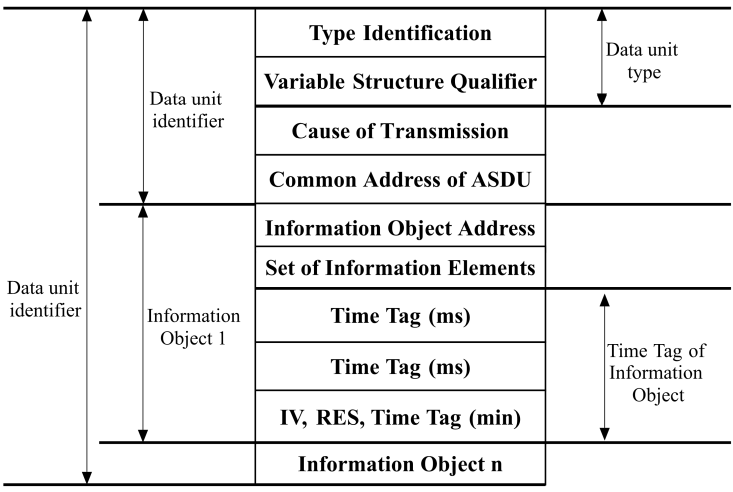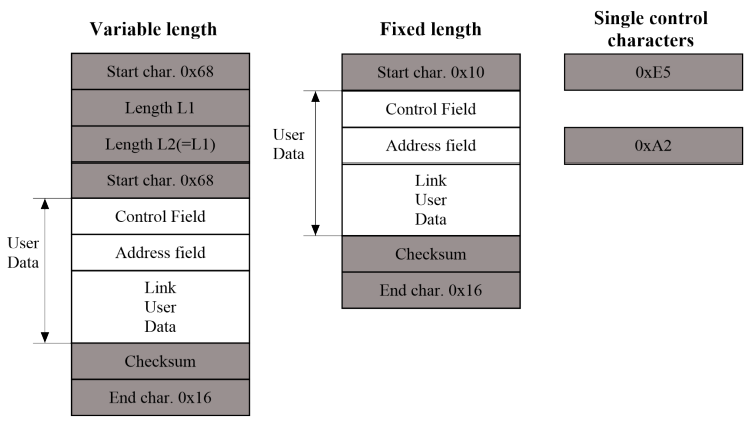14.2 IEC 60870-5-101 Master
The IEC 60870-5-101 protocol is a companion standard for power system monitoring, control associated communications for telecontrol, teleprotection and associated telecommunications for electric power systems. Standard IEC 60870-5-101 was prepared by IEC Technical Committee 57 (Power system control and associated communications).
Standard IEC 60870-5-101 defines an Application Service Data Unit (ASDU Figure below). In ASDU there is an ASDU identifier (with the type of ASDU in it) and information objects.
IEC 60870-5-101 ASDU structure
Common Address of ASDU Defines the stations' address and can be configured in Devices asdu_address field for source and Signals common_address field for the destination.
Information Object Address Used as destination object address in the control direction and as source object address in the monitor direction can be configured in the Signals info_address field.
Standard IEC 60870-5-101 transmission frames are separated into 3 different types: frame with variable length, frame with fixed length, and single control characters
IEC 60870-5-101 ASDU structure
The control field provides information about the message direction, type of service, and checksum.
The address field specifies the link address which points to the message's destination. WCC Lite supports IEC 60870-5-101 Master protocol over a serial link (according to EIA RS485). Its full functionality list can be found in an IEC 60870-5-101 PID Interoperability List which can be downloaded separately from this user manual.
Configuring datapoints (master)
The IEC 60870-5-101 Master in WCC Lite has to be configured in Excel. This configuration contains two Excel sheets where parameters must be filled in Devices and Signals.
IEC 60870-5-101 master parameters for Devices tab
| Parameter |
Type |
Description |
Required |
Default value (when not specified) |
Range |
|
|
Min |
Max |
|||||
|
name |
string |
User-friendly name for a device |
Yes | |||
|
description |
string |
Description of a device |
No | |||
|
device_alias |
string |
Alphanumeric string to identify a device |
Yes | |||
| enable | boolean |
Enabling/disabling of a device |
No | 1 | 0 | 1 |
| protocol | string |
Protocol to be used |
Yes | IEC 60870-5-101 master | ||
| device |
string |
Communication port |
Yes |
|
PORT1 |
PORT2 |
| baudrate | integer |
Communication speed (bauds/s) |
No |
9600 |
600, 1200, 2400, 4800, 9600, 19200, 38400, 57600, 115200 |
|
| databits | integer |
Data bit count for communication |
No |
8 |
6 |
9 |
| stopbits | integer |
Stop bit count for communication |
No |
1 |
1 |
2 |
| parity |
string |
Communication parity option |
No |
none |
none, even, odd |
|
| flowcontrol |
string |
Number of requests, before the link is considered lost (device status signals are changed) and reconnect attempt will be issued |
No |
none |
none |
|
| link_address | integer | Destination address when in transmit and source address when broadcasting | Yes | 0 | 65535 | |
| link_size | integer | Link address size in bytes | No | 1 | 1 | 2 |
| asdu_address | integer | Application Service Data Unit address | Yes | 0 | 65535 | |
| asdu_size | integer | Common address size in bytes | No | 1 | 1 | 2 |
| ioa_size | integer | Information object address (IOA) size in bytes | No | 2 | 1 | 3 |
| cot_size | integer | Cause of transmission (COT) size in bytes | No | 1 | 1 | 2 |
| time_sync_interval_sec | integer |
Defines how often (in seconds) a slave will request time synchronization. If greater than 0 – slave will request synchronizations and will reset the timer if the master did it earlier. If 0 – slave won’t request timesyncs, but will allow them. If 1 – time syncs are not supported, all time sync requests will be dropped. |
No | 60 | ||
| broadcast_timesync | integer |
Enables or disables broadcast time sync. If 1 - enabled |
No | 0 | 1 | |
| gi_interval_sec | integer | The time frame between General Interrogation requests in seconds if 0 requests are disabled | No | 300 |
|
|
| scan_rate_ms | integer |
Polling interval in milliseconds. The time frame between two telegrams from the master |
No | 100 | ||
| timeout_ms | integer |
Response timeout in milliseconds |
No |
1000 |
|
|
| retry_count | integer |
Number of retries of failed requests before announcing that the device is in Error state |
No | 1 | ||
IEC 60870-5-101 master parameters for Signals tab
| Parameter |
Type |
Description |
Required |
Default value (when not specified) |
Range |
|
|
Min |
Max |
|||||
|
signal_name |
string |
User-friendly signal name |
Yes | |||
|
device_alias |
string |
Alphanumeric string to identify a device |
Yes | |||
|
signal_alias |
string |
Unique alphanumeric name of the signal to be used |
Yes | |||
|
source_device_alias |
string |
device_alias of a source device |
For commands | |||
|
source_signal_alias |
string |
signal_alias of a source signal |
For commands |
|||
| enable | boolean |
Enabling/disabling of an individual signal |
No | 1 | 0 | 1 |
|
log |
integer |
Allow signal to be logged. If the log is 0 signal will not be logged. If the log is more than 0 signal will be logged |
No | 0 | ||
| gi | boolean | Including/excluding (1 or 0) signals from General Interrogation | No | 0 | 0 | 1 |
| common_address | integer | Address of a destination device | No | 1 | ||
| info_address | integer | Information object address | Yes | |||
| data_type | integer | ASDU type identifier | Yes |
1, 2, 3, 4, 5, 6, 9, 10, 11, 12, 13, 14, 30, 31, 32, 34, 35, 36, 45, 46, 47, 48, 49, 50
|
||
| periodic_update_ms | integer | Signal value is published periodically according to the value set. | No |
|
||
| tag_job_todo | string | The device status signal can be configured by providing given value |
No |
No |
communication_status |
|
Device status signals
IEC 60870-5-101 has an additional signal which can be configured to show communication status. It is used to indicate if the slave device has disconnected from the master (WCC Lite). To configure such signal for IEC 60870-5-101 protocol, tag_job_todo field with string value is required. For IEC 60870-5-101 master required parameters for the status signal will be: signal_name, device_alias, signal_alias, and tag_job_todo. Tag_job_todo value must be: communication_status. If the signal returns the value of 1 – the device or protocol connection is on and working correctly, if 2 – the device is off or the protocol is disconnected.
Debugging an IEC 60870-5-101 Master application
If the configuration for IEC 60870-5-101 devices is set up, a handler for the protocol will start automatically. If the configuration is missing parameters or contains errors, the protocol will not start. It is done intentionally to decrease unnecessary memory usage.
If IEC 60870-5-101 does not work properly (e.g. no communication between devices, data is corrupted, etc.), a user can launch a debug session from the command line interface and find out why the link is not functioning properly. To launch a debugging session, a user should stop the iec101-master process and run the iec101-master command with respective flags as shown in the table below.
Procedure for IEC 60870-5-101 master service debugging:
- Step 1: Service must be stopped by entering the following command into the WCC Lite:
/etc/init.d/iec101-master stop - Step 2: After the service is stopped it must be started with the preferred configuration file (JSON files found in /etc/ folder) and a debug level 7:
Additional output forming options are described here: Command line arguments.iec101-master -c /etc/iec101-master/ttyPORT1.json -d7 - Step 3: Once the problem is diagnosed normal operations can be resumed with the following command:
/etc/init.d/iec101-master start
IEC 60870-5-101 command line debugging options
-h [ –help ] Display help information
-V [ –version ] Show version
-d<debug level> Set debugging level
-c [ –config ] Config path
-e [ –redis ] Show redis debug information
